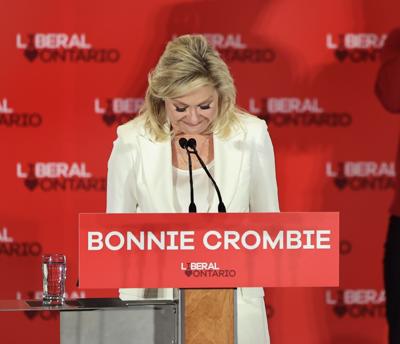Ontario Liberals are wondering what went wrong in the last provincial election.
Now, Bonnie Crombie is trying to make things right. Whether she has the right answers is anybody’s guess.
Facing a leadership review vote this weekend, Crombie is fighting for her political life. Confronting all the complaining, she is countering with lots of explaining.
On Monday, she set the stage for her survival strategy: Crombie responded publicly to a depressing postelection post mortem by proffering a personal mea culpa and a promise to learn lessons.
The leader’s remonstrations were meant to be reassuring, but the report itself had few revelations. It was a reprise of past post mortems after previous Liberal losses.
Seen one, seen them all. And we’ve seen a few — three, in fact — since the 2018 defeat.
The report claims the Progressive Conservatives had an unfair advantage by calling an early, so-called “snap election.” In fact, the early date was preordained — telegraphed more than a year in advance by campaign operatives.
In truth, there were no surprises, just excuses. Better to just say sorry — something Premier Doug Ford is awfully good at when getting it wrong in his own right.
Interestingly, the last Liberal post mortem set one major goal that Crombie successfully achieved: “We must be realistic and focus on achieving (official) party status so we can build from there,” it argued.
That Crombie’s Liberals won 30 per cent of the popular vote, while the NDP tumbled to just 18.5 per cent, was a worthy achievement. That the Liberals won only 14 ridings — exceeding the legislature’s cut off of 12 to win official party status — was a bittersweet reminder that Crombie’s campaign machine couldn’t translate all those votes into seats across the province (the NDP held on to 27 seats).
The unanswered question in this year’s election, according to the latest post mortem: “Why should I vote for Bonnie?
The question going into this weekend’s review is much the same: “Why should I vote for Bonnie?”
There are no great answers, just good reasons.
What haunts Crombie still is her failure to win a riding — or any ridings — in her home base of Mississauga, despite boasting of her popularity as its former mayor. Winning in Mississauga was core to her mission, and she is now the only party leader without a seat or a soap box in the legislature.
Luckily for the heretofore unlucky Liberal leader, the latest depressing public opinion polls offer a counterintuitive proof point to help her survive the review.
Ford’s Tories hold a seemingly unassailable lead with 53 per cent voter support, according to an Abacus Data survey last month. That’s up an astonishing 10 percentage points since the election.
Crombie’s Liberals were stuck at 27 per cent, down from 30 per cent on election day. But the NDP had tumbled to a new low of 12 per cent in the poll, compared to 18.5 per cent last February.
How can those numbers help Crombie’s case? Coletto’s contrarian conclusion was that Ford is still surfing the wave of anti-Americanism that he harvested in the campaign by playing the role of Captain Canada — and there’s not much anyone can do about it until further notice.
“The problem Crombie faces isn’t personal, it’s structural,” Coletto argued. “Any other Liberal leader would be up against a deeply popular premier and a government whose support is not only wide but growing.”
Put another way, changing leaders won’t change the dynamic anytime soon. Most Liberals know that intuitively, which is why no major Liberal rival is openly challenging Crombie or promising to run in her stead and rescue the party.
In truth, any pretenders to the throne are waiting in the wings for the throne to be more attractive — which may be years away. That’s why the decision for delegates is difficult — it’s hard to vote for a new race if no one especially electable wants to run.
No alternative means no appetite for leadership limbo.
Crombie has her strengths and weaknesses, but the criticism that her policy platform didn’t take off feels like Monday morning quarterbacking. Focused on health care, tested on focus groups, it wasn’t so much wrong-headed as badly timed.
In February, Ford resonated when voters wanted reassurance on the American economic threat. Crombie’s Liberals failed to pivot, but it’s not as if his platform was more rigorous — he has won three elections with a paucity of policy.
Leadership reviews are as unpredictable as elections, but a lot less enduring. A majority government is good for four years, while a leadership vote can mean everything and nothing in short order.
People speculate wildly on what threshold the leader must surmount — is it 66 per cent or 76 to survive? Let us not forget the fate of Pauline Marois, one-time leader of the Parti Québecois, who achieved an enviable 93 per cent vote of confidence in a postelection leadership review, only to be deposed a few months later by her caucus.
Leadership reviews come and go. We’ll see this Sunday whether Liberals believe Crombie has staying power.
Error! Sorry, there was an error processing your request.
There was a problem with the recaptcha. Please try again.
You may unsubscribe at any time. By signing up, you agree to our and . This site is protected by reCAPTCHA and the Google and apply.
Want more of the latest from us? Sign up for more at our newsletter page.



















To join the conversation set a first and last name in your user profile.
Sign in or register for free to join the Conversation